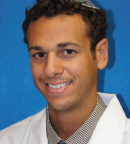
People under 50 normally are not considered at risk; however, not only did we find that the percentage of young-onset colorectal cancer cases is rising, but within the younger age group, we found a higher percentage of diagnoses at later stages, which is extremely concerning.— Elie Sutton, MD
Tweet this quote
Colorectal cancer is being increasingly diagnosed in persons younger than age 50, the age at which colorectal cancer screening is usually initiated. According to Elie Sutton, MD, of Mount Sinai West Hospital in New York, a review of cases in the National Cancer Data Base revealed that between 2004 and 2013, the number of young-onset cases of colorectal cancer increased by 11.4%. Dr. Sutton, a research fellow under the direction of Richard L. Whelan, MD, a colorectal surgeon in New York, reported his findings at Digestive Disease Week 2016.1
“This represented an average increase of approximately 1.28% (P < .001), or 136 new cases, each year,” he said, noting that colorectal cancer is the second leading cause of cancer deaths, second to lung cancer. “It is important to note that in our analysis, we do not have data on the change in population over the time period studied. Though we have noticed a definite increase in the number of colorectal cancers in the under 50 age group, we cannot be sure that this means the incidence of colorectal cancer in the under 50 group has increased. We hope to carry out a follow-up study once current population data are available; our goal would be to determine the actual incidence in younger people that accounts for population changes in the future,” he added.
For persons aged 50 and older, on the other hand, the number of cases during that period fell by 2.5%. This may be the result of heightened awareness of the need for screening among persons over 50, suggested Dr. Sutton. “People under 50 normally are not considered at risk; however, not only did we find that the percentage of young-onset colorectal cancer cases is rising, but within the younger age group, we found a higher percentage of diagnoses at later stages, which is extremely concerning,” he added.

Richard L. Whelan, MD
“After examining more than 1 million records over 10 years, our findings suggest that health-care providers should be more vigilant about detecting symptoms in younger individuals,” suggested Dr. Sutton. “We also should consider lowering the threshold for performing colonoscopies in young individuals who present with symptoms, such as changes in bowel habits or rectal bleeding.”
Study Details
Dr. Sutton and his team identified 1,010,530 cases of colorectal cancer in the database: 70.5% in the colon, 20.9% in the rectum, and 7.6% in the rectosigmoid area.
Their main observations were the increase in colorectal cancer rates in the young-onset group and the higher incidence of advanced-stage cancers in this group. In the young-onset group, 30.6% were stage 3 at the time of diagnosis, compared with 25.1% in those ≥ age 50, and stage 4 cancers were diagnosed in 25.6%, compared with 18.2% (P < .001). Liver metastases were also more prevalent in the young-onset group (19.4% vs 13.8%; P < .001).
By ethnicity, young-onset cancer was more common among nonwhite patients (22.1%) than older-onset cases (16%; P < .001). The researchers are looking for explanations for race/ethnicity differences.
Hospitalization and survival rates also differed between the age cohorts. In contrast, however, younger patients fared better, with 56.6% of younger patients being discharged within 5 days vs 43.3% of the older group. The 30-day mortality rates were 0.6% vs 3.5%, respectively, and 90-day mortality rates were 1.6% vs 6.4% (P < .001), respectively.
“Studies of colorectal cancer conducted about 5 years ago found a similar trend toward young-onset colorectal cancer, which means that between the time of that research and our study, we still have not adequately addressed the risk of young-onset colorectal cancer. It’s critical that we reverse this trend, so we are able to reduce, and hopefully eliminate, it in all populations, regardless of age,” stated Dr. Sutton. ■
Disclosure: Dr. Sutton reported no potential conflicts of interest.
Reference


